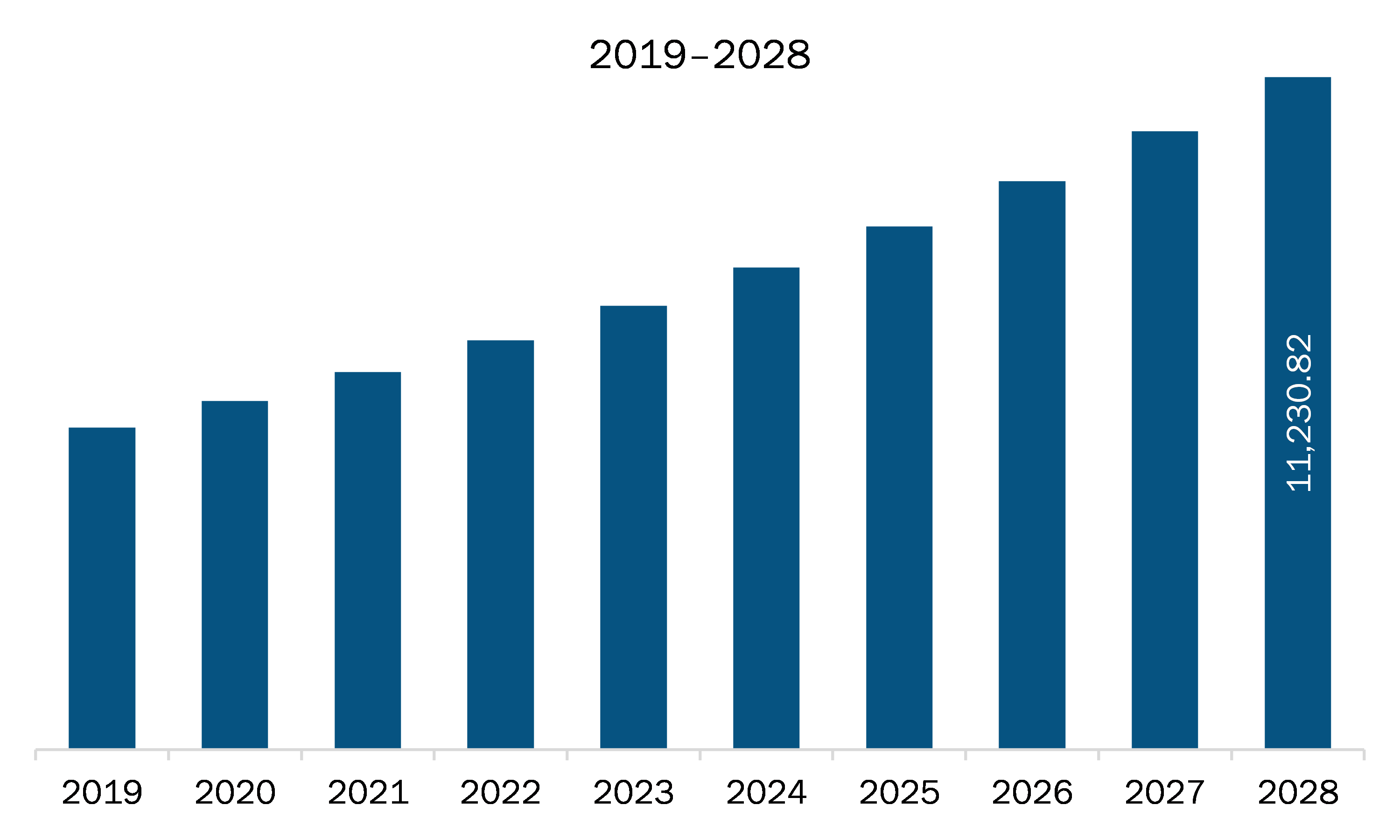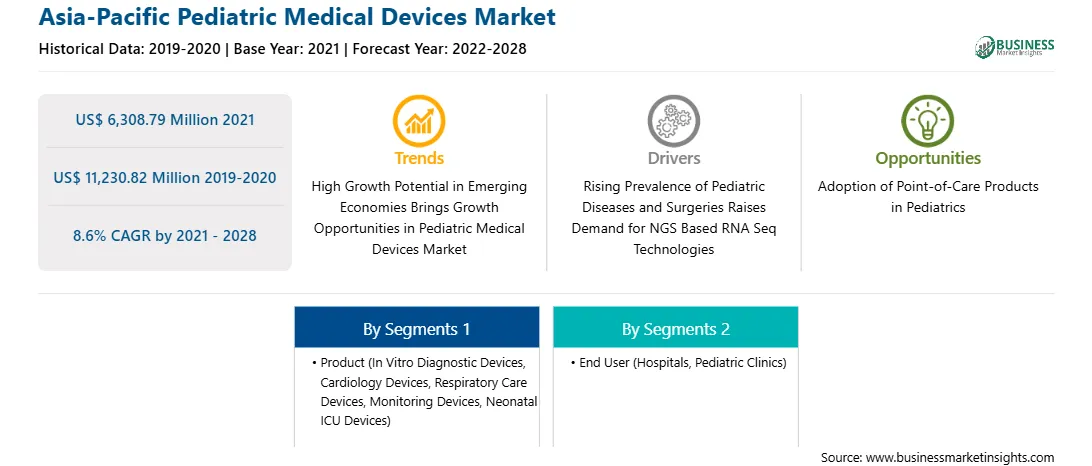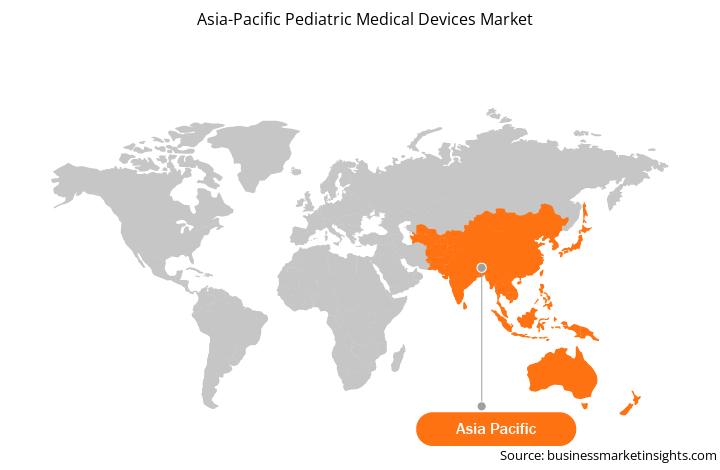The pediatric medical devices market in APAC has been segmented into China, India, Japan, Australia, South Korea, and rest of APAC. The market in this region is registering impeccable growth with major sales witnessed in Japan, South Korea, and China. Moreover, metropolitan cities with increasing level of pollution giving birth to various cardiovascular, neurological and other diseases among the children have been major contributors to the majority of the sales registered by the region. Higher disposable income, increasing number of R&D activities, innovative technology and products, and increasing number of medical devices increasing chronic diseases, in this region has created favorable business environment for pediatric medical devices market in APAC.
The 2019 novel coronavirus (2019-nCoV), officially named COVID-19 by the WHO, has spread to more than 180 countries, including China, prompting the WHO to declare the disease a global pandemic. The supply chain disruptions, along with the massive demand for efficient treatments for the therapy of COVID-19, have put the healthcare research industry in a crucial situation in APAC. Prohibitive measures have been taken to control the spread of the virus. The COVID-19 pandemic has broadly affected the economies in APAC. Countries such as India, China, Japan, South Korea were adversely affected by the pandemic. The socioeconomic factors were severely affected, rising in negative inflation, GDPs, and a surge in unemployment in the region toward medical devices. The pandemic has affected three main aspects of the global economy: production, supply chain, and firms and financial markets. Japan, China, South Korea, India, and Australia are the most affected countries due to the increasing number of COVID-19 cases and the associated deaths. Manufacturers and suppliers of medical devices have shifted their focus from regular pediatric medical devices to developing and supplying COVID-19 essentials and medical devices used for respiratory issues. This scenario has negatively impacted the pediatric medical devices market. The pandemic has affected business operations of various key players operating in this region. Furthermore, business strategies such as acquisitions, mergers, and partnerships are adversely affected by the imposition of complete lockdown. Such obstructions in business activities are projected to hamper the adoption of various technologically advanced healthcare systems, including medical devices.

Strategic insights for the Asia-Pacific Pediatric Medical Devices provides data-driven analysis of the industry landscape, including current trends, key players, and regional nuances. These insights offer actionable recommendations, enabling readers to differentiate themselves from competitors by identifying untapped segments or developing unique value propositions. Leveraging data analytics, these insights help industry players anticipate the market shifts, whether investors, manufacturers, or other stakeholders. A future-oriented perspective is essential, helping stakeholders anticipate market shifts and position themselves for long-term success in this dynamic region. Ultimately, effective strategic insights empower readers to make informed decisions that drive profitability and achieve their business objectives within the market.

| Report Attribute | Details |
|---|---|
| Market size in 2021 | US$ 6,308.79 Million |
| Market Size by 2028 | US$ 11,230.82 Million |
| Global CAGR (2021 - 2028) | 8.6% |
| Historical Data | 2019-2020 |
| Forecast period | 2022-2028 |
| Segments Covered |
By Product
|
| Regions and Countries Covered | Asia-Pacific
|
| Market leaders and key company profiles |
The geographic scope of the Asia-Pacific Pediatric Medical Devices refers to the specific areas in which a business operates and competes. Understanding local distinctions, such as diverse consumer preferences (e.g., demand for specific plug types or battery backup durations), varying economic conditions, and regulatory environments, is crucial for tailoring strategies to specific markets. Businesses can expand their reach by identifying underserved areas or adapting their offerings to meet local demands. A clear market focus allows for more effective resource allocation, targeted marketing campaigns, and better positioning against local competitors, ultimately driving growth in those targeted areas.

The pediatric medical devices market in APAC is expected to grow from US$ 6,308.79 million in 2021 to US$ 11,230.82 million by 2028; it is estimated to grow at a CAGR of 8.6% from 2021 to 2028. The increasing prevalence of cancer among children is expected to augment the demand for the pediatric medical devices associated with the market across the world. The cancer-causing factors among children are abnormal mutation, genetic predisposition, inherited versus acquired gene mutations, lifestyle and environment associated factors, and others.
Moreover, the rising prevalence of respiratory diseases and disorders is expected to drive the APAC market for pediatric medical devices. Different types of medical devices are used during the treatment and monitoring of pediatric patients. Compared to adults, children's body structure and position need to be managed and maintained during various procedures such as MRI scans, X-ray imaging, blood sampling procedures, and others. For instance, the rising prevalence of respiratory diseases such as the COVI19 among children is expected to create the need for monitoring devices such as pulse oximeters, critical care devices, ventilators, warmers, and others. Thus, the rising prevalence of such diseases is driving the market during the forecast period. Another critical factor supporting the growth of this market are increase in the rates of premature births.
APAC pediatric medical devices market is segmented into product, end user, and country. The pediatric medical devices market, by product, is segmented into in vitro diagnostic (IVD), cardiology devices, respiratory care, monitoring devices, neonatal ICU devices, and others. The in vitro diagnostic segment is likely to hold the largest share of the market in 2021. Based on end user, the pediatric medical devices market is segmented into hospitals, pediatric clinics, and others. The hospitals segment is likely to hold the largest share of the market in 2021. Based on country, the APAC pediatric medical devices market is segmented into Australia, China, India, Japan, South Korea, and rest of APAC. China held the largest market share in 2021.
A few major primary and secondary sources referred to for preparing this report on the pediatric medical devices market in APAC are company websites, annual reports, financial reports, national government documents, and statistical database, among others. Major companies listed in the report are Atom Medical Corp.; F. Hoffmann-La Roche Ltd.; General Electric Company; Hamilton Medical; Koninklijke Philips N.V.; Medtronic; and Siemens AG.
The Asia-Pacific Pediatric Medical Devices Market is valued at US$ 6,308.79 Million in 2021, it is projected to reach US$ 11,230.82 Million by 2028.
As per our report Asia-Pacific Pediatric Medical Devices Market, the market size is valued at US$ 6,308.79 Million in 2021, projecting it to reach US$ 11,230.82 Million by 2028. This translates to a CAGR of approximately 8.6% during the forecast period.
The Asia-Pacific Pediatric Medical Devices Market report typically cover these key segments-
The historic period, base year, and forecast period can vary slightly depending on the specific market research report. However, for the Asia-Pacific Pediatric Medical Devices Market report:
The Asia-Pacific Pediatric Medical Devices Market is populated by several key players, each contributing to its growth and innovation. Some of the major players include:
The Asia-Pacific Pediatric Medical Devices Market report is valuable for diverse stakeholders, including:
Essentially, anyone involved in or considering involvement in the Asia-Pacific Pediatric Medical Devices Market value chain can benefit from the information contained in a comprehensive market report.